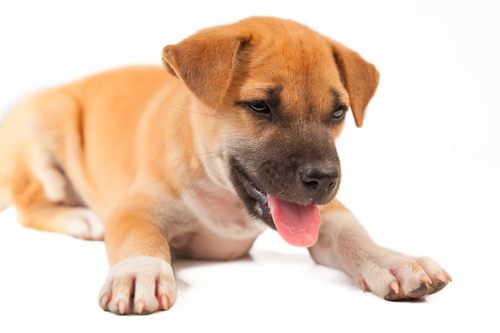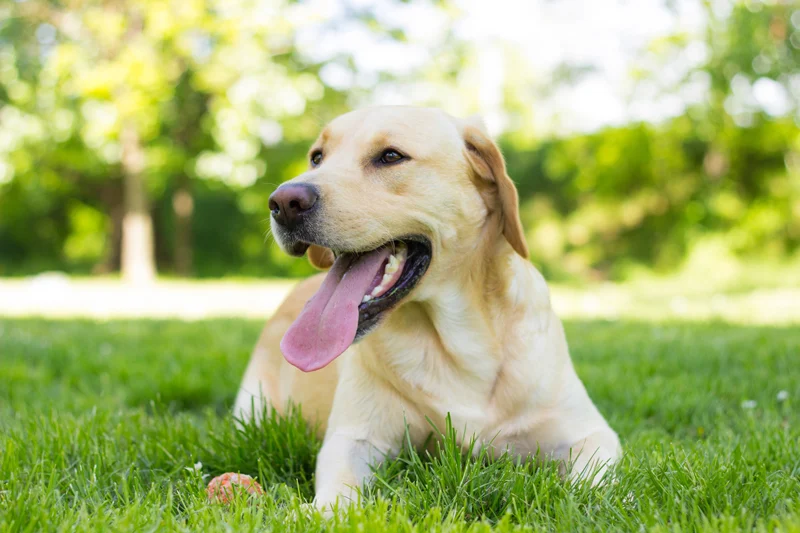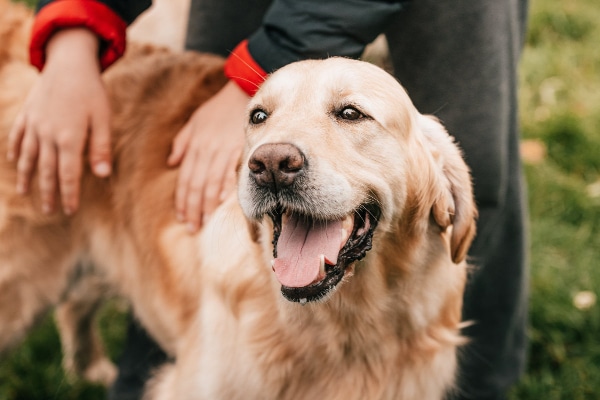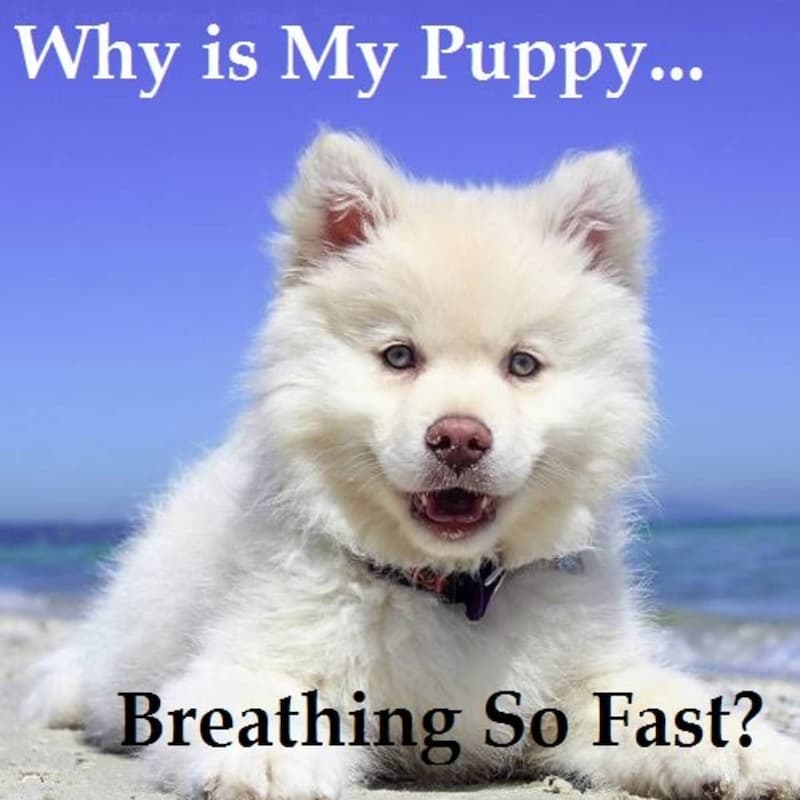New pet parents who are unfamiliar with puppies are often concerned about how fast their puppy is breathing, and even experienced dog owners may ask themselves, “Why is the puppy breathing so fast?” If your new puppy is breathing fast, you may wonder if this is normal, or if you need to see a vet. This is normal for a puppy’s biological system, which is different from ours, causing dogs to breathe about twice as fast as humans, today we’ll review the various reasons why your puppy might be short of breath.
Normal Breathing in Dogs
Dogs do breathe faster than humans. While most people breathe between 12 and 20 breaths per minute at rest, for dogs, the breathing rate is almost double that. Dogs can breathe anywhere from 15 to 35 breaths per minute while at rest and are still considered to be within the normal range.
Smaller dogs tend to breathe faster than larger dogs. You can expect large dogs to be on the low end and your toy and miniature breeds to be on the high end.
When you don’t care about your dog’s breathing, it’s a good idea to occasionally count your dog’s breath. This will give your dog a “normal” baseline against which you can compare when you do have cause for concern.
During and after exercise, you will notice that your dog’s breathing increases significantly, even up to tenfold. After the chase game, their breathing rate may be between 100 and 350 breaths per minute, but once they return to a calm state, the breathing rate should not exceed 10 minutes.
Causes of Breathing Fast in Puppies

You may want more information. Let’s break down the specific causes of shortness of breath in puppies into a few groups and go from there. For reference, the normal resting breathing rate for a puppy is 15-40 breaths per minute, slightly higher than the 10-30 breaths per minute for an adult dog.
Normal Cause
There are many normal reasons why your puppy is breathing so fast. As mentioned above, the most likely cause is exercise. If a puppy is running around all afternoon, its body will need a lot of oxygen to supply its hard-working cells, and it will need to get rid of a lot of carbon dioxide. Breathing quickly can help correct this problem quickly.
Stress, excitement, and fear are all linked to the stress hormone cortisol. Also known as the fight-or-flight hormone, it increases heart rate when activated. Since the heart is a muscle, it needs oxygen to function. A fast heartbeat can lead to tachypnea because the lungs send more oxygen to the heart. Is your puppy startled or excited? This may be the reason for the rapid breathing rate. Cortisol can also cause an increase in breathing rate caused by pain. If your puppy hurts herself sadly, it may breathe faster.
Finally, the second function of the lungs is to help cool the body by expelling hot air and inhaling cold air. Since dogs only sweat through their feet and nose, the lungs are especially important in regulating heat. The heat is created for exercise, or simply because of the environment – if your puppy is too hot, it will pant and lose some heat. Take extra care in training puppies on hot days, as these two heat sources can overwhelm their compensatory mechanisms and cause heatstroke – heatstroke can be fatal, especially in puppies, so if they’re panting, be sure to help them cool down. For the same reason, fever caused by illness can also cause shortness of breath.
Lung Disease
Lung disease affects the capacity or performance of the lungs, resulting in reduced oxygen intake. To compensate, the lungs speed up – lung disease often causes very fast but shallow breathing. There are many types of lung diseases.
In puppies, infectious lung disease is probably the most common. These include canine cough, bronchopneumonia, viral infections such as influenza, and lungworm. These diseases damage the lungs, filling them with infection and reducing the exchange area for oxygen and carbon dioxide. Secondary infection (or just a simple blockage) after inhaling objects such as grass seeds is also a common cause of rapid breathing. Generally, a puppy with a lung infection will also have a fever, cough, and be in poor health, so contact your veterinarian if you suspect a lung infection.
Sometimes newborn puppies are born breathing very fast because their lungs are not functioning properly. When an animal is born, the lungs are usually immature and filled with fluid — usually clearing within a few hours of birth, but it can sometimes take longer, especially when puppies are born prematurely. In this case, the puppy will usually breathe very quickly. Newborn puppies are very fragile, so puppies like this require a lot of veterinary care.
Finally, the lungs can also be physically damaged, reducing their capacity, leading to compensatory rapid breathing. For example, a bruise or puncture after an accident, or damage to the ribs or diaphragm that control the movement of the lungs. These events are clearly emergencies because there may be other problems, such as internal bleeding.
Heart Disease
The heart is closely related to the lungs. It pumps blood into the lungs where oxygen and carbon dioxide can be exchanged. If the heart is not working properly, the lungs sometimes have to compensate by breathing faster. Most heart disease in puppies is present from birth — it’s rare to develop heart disease at such a young age.
Before a puppy is born, the developing heart goes through a lot of changes. However, sometimes these changes go wrong or don’t happen, leading to congenital heart malformations such as narrowed blood vessels, perforated hearts, or leaking valves. These can cause blood to flow in the wrong direction, or the heart has to work harder under stress. The result is an overworked heart. We can sometimes hear these defects, such as a heart murmur, through a stethoscope. Only the most severe heart defects can cause disease and tachypnea in puppyhood—many defects either cause no effect or cause disease later in life. Puppies with heart disease may have a mild cough and be very lethargic.
When Is It Normal For Dogs To Breathe Heavily?

While your dog’s resting breathing rate should stabilize between 15 and 30 breaths per minute, it is normal for their breathing rate to increase significantly in some cases, at least for a short period of time.
Stress And Anxiety
You may find that when you bring your puppy home for the first time, they breathe very fast. This can be caused by the stress and anxiety associated with adjusting to a new home. This is normal and will change over time.
Think about it; they were taken away from their mothers and littermates into an unfamiliar environment, and there were a lot of people who wanted to hug them. They will be stressed out! This should go through in about a week.
Other signs that your dog or puppy may be stressed include frequent yawning, drooling, licking, pacing, shaking, general inability to stay still, excessive shedding, and avoiding family members.
While adjusting to a new home is the most common cause of stress for puppies, being left alone for long periods of time in adult dogs is the most common cause of stress.
If you’re away from home for a long time and someone comes to visit your dog during the day, it can have a big impact on their mental health.
At High Temperature
When the weather is hot, your dog may start breathing rapidly to lower his body temperature. You may notice them doing other things to stay cool, like finding a cool place to put their tummy down. It may be perfectly normal for them to be short of breath for a few hours on a very hot day.
While your dog is doing their best to control its body temperature, they are at risk of heat stroke if exposed to the heat for extended periods of time.
Think about what you can do to help them lower their temperature. Make sure they have access to the shade, a cool place, or let them sit in front of a fan, and make sure they have enough cold water to sip on.
During And After Exercise
As we’ve already said, it’s perfectly normal for your dog to have a tenfold increase in breathing rate while they’re playing, and then continue to be high for a while as their body returns to a comfortable temperature.
As long as your dog’s breathing doesn’t seem painful, you shouldn’t be concerned about breathing too quickly during exercise. After exercising, they need to rest for about 10 minutes at most to resume normal breathing.
If it takes longer, it could be a sign that they are over-exercising and you may want to tone down on your next outing.
Puppies can’t resist a little fun, and even when they’re exhausted, they’ll force themselves to keep up with you.
Active Dream
It may be odd to see your dog breathing faster than normal while sleeping, but it’s usually nothing to worry about.
Dogs often have positive dreams of chasing their favorite prey or playing with other puppies. If they get a good workout in their sleep, their breathing rate may rise as if they were actually doing these things.
This type of dream is often accompanied by other signs, such as complaints and occasional leg twitches. Also, when they wake up, their breathing should quickly return to normal.
Try not to wake them up when they have these dreams. Just as being woken up while you’re in deep REM sleep can make you uncomfortable, so can your dog.
When To Worry About Accelerated Breathing

If your dog seems to be breathing at an accelerated rate for prolonged periods of time for no apparent reason, you may start to worry. The first thing to do is count their breaths, feel how fast they are breathing, and compare that to normal.
If you’re unsure of the cause, such as a high temperature, it’s time to talk to your veterinarian to get a diagnosis of what might be happening.
Breathing problems are especially important when it comes to brachycephalic breeds, as breathing problems can be one of the first symptoms they show. Brachycephalic breeds are dogs with flat, flat faces.
Below are the most common conditions associated with accelerated breathing, along with other accompanying symptoms you can expect to notice if they affect your dog.
- Asthma
In addition to shortness of breath, other common symptoms of dog asthma include sudden difficulty breathing, persistent cough, wheezing with an open mouth, blue gums, loss of appetite, and low energy.
- Lung cancer
Lung cancer is only common in older dogs. In addition to shortness of breath, other common symptoms include cough, lethargy, vomiting, weight loss, hair loss, loss of appetite, lameness, fever, and gastrointestinal ulcers.
- Kennel cough
This is a highly contagious respiratory disease in dogs that is usually spread when large numbers of dogs come into contact as in a kennel. In addition to shortness of breath, severe coughing, runny nose, sneezing, lethargy, loss of appetite, and low-grade fever may also occur.
laryngeal paralysis
This disease can make it difficult for your dog to close the windpipe while eating and drinking, which can lead to all kinds of problems.
In addition to rapid breathing, you may notice strange noises when inhaling, changes in the bark sound, blue discoloration around the tongue and gums, and coughing or vomiting when eating or drinking.
- Tracheal problems
Dogs can be affected by a variety of airway problems, including airway pressure and airway collapse. In addition to rapid breathing, you may also notice coughing, vomiting, vomiting, and blueness around the mouth.
- Bacterial or fungal respiratory infection
In addition to breathing difficulties, if your puppy has a respiratory infection, you may see snoring and sneezing, discharge around the nose and eyes, foam around the mouth, high fever, loss of appetite, weight loss, fatigue, and lethargy.
smoke inhalation
If your dog is exposed to the fumes they inhale, you may see coughing and wheezing, red or inflamed eyes, lethargy, weakness, and blistering around the mouth, in addition to rapid breathing.
- Pain
When your dog is in some kind of pain, increased breathing as a stress response can be one of the various symptoms it presents.
You can also skillfully shake, squish your ears, moan, low stance, whimper, excessively lick or scratch specific areas, be reluctant to play or move, or lose your appetite.
- Parasite
If your dog is infected with a parasite, such as a heartworm, shortness of breath may be one of the symptoms. You may also see diarrhea, vomiting, movement, bloating, weight loss, decreased activity, and dull fur.
compressed lung
Compression lung or pneumothorax is the accumulation of air outside the lungs but within the chest wall. This prevents the lungs from inflating properly. As the compression puts pressure on the lungs, it can lead to accelerated and abnormal breathing. You may also notice dull sounds from their breathing, coughing, and hypoventilation.
- Hernia
A hernia is when the contents of a dog’s abdomen pass through a hole or weakness in the muscle wall. It can be congenital, or it can be accidental.
You may notice vomiting, loss of appetite, drooling, and other painful symptoms when your dog suffers from a hernia, swelling at the hernia area, and shortness of breath
- Anemia
Anemia occurs when a dog does not produce enough red blood cells or hemoglobin. This may affect some important bodily functions. Dogs with anemia usually breathe very quickly. They may also have pale gums, look weak and lethargic, and have dark stools.
- Drug
Certain medications can cause your dog to start breathing rapidly. This side effect should be listed on the drug along with other symptoms to watch out for.
Final Thoughts
We hope our long list of causes of shortness of breath in puppies doesn’t frighten you too much. For most puppies, rapid breathing is a short-lived and normal effect that shouldn’t concern you. You should only consider talking to your veterinarian if your puppy is short of breath for prolonged periods of time, or has other signs of illness. More than likely, you have a very excitable puppy that won’t calm down!





